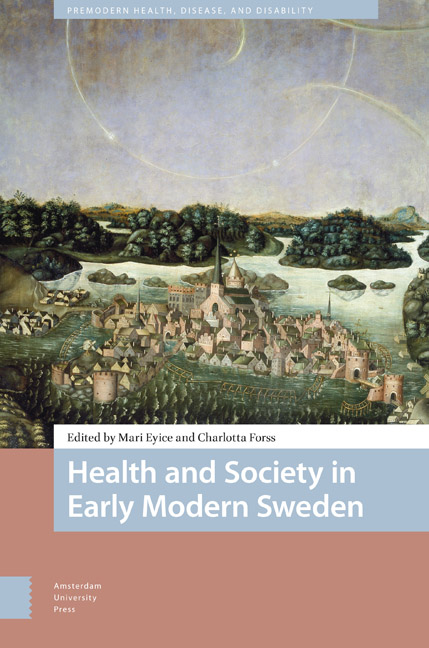Book contents
- Frontmatter
- Contents
- List of Tables and Figures
- Acknowledgements
- 1 Meanings of Health in Early Modern Sweden
- 2 Illness as Incapacity to Work in Early Modern Sweden
- 3 The Body in the Bathhouse: Health and Bathing in Early Modern Sweden
- 4 ‘Somewhat Heated, Quick and Lively’ : Humoral Explanations of the Learning Difficulties of Charles XI of Sweden (1655–1697)
- 5 Health in Body and Soul in a Female Birgittine Convent 1516–1522
- 6 Curing Madness and Mental Disturbances : Religious Healing Activities in Early Modern Swedish Local Communities
- 7 Not Quacks but Close : Reappraising the Role of Physicians on the Eighteenth-Century Medical Market
- 8 Gender, Health, and Hair in Sweden, 1740–1840
- 9 Gender Norms and Early Modern Healthcare : Barber-Surgeons in Sweden c. 1600–1900
- Epilogue : Epistemologies of Body and Soul: Considering the Early Modern and (Late) Modern History of Health
- Index
9 - Gender Norms and Early Modern Healthcare : Barber-Surgeons in Sweden c. 1600–1900
Published online by Cambridge University Press: 16 April 2024
- Frontmatter
- Contents
- List of Tables and Figures
- Acknowledgements
- 1 Meanings of Health in Early Modern Sweden
- 2 Illness as Incapacity to Work in Early Modern Sweden
- 3 The Body in the Bathhouse: Health and Bathing in Early Modern Sweden
- 4 ‘Somewhat Heated, Quick and Lively’ : Humoral Explanations of the Learning Difficulties of Charles XI of Sweden (1655–1697)
- 5 Health in Body and Soul in a Female Birgittine Convent 1516–1522
- 6 Curing Madness and Mental Disturbances : Religious Healing Activities in Early Modern Swedish Local Communities
- 7 Not Quacks but Close : Reappraising the Role of Physicians on the Eighteenth-Century Medical Market
- 8 Gender, Health, and Hair in Sweden, 1740–1840
- 9 Gender Norms and Early Modern Healthcare : Barber-Surgeons in Sweden c. 1600–1900
- Epilogue : Epistemologies of Body and Soul: Considering the Early Modern and (Late) Modern History of Health
- Index
Summary
Abstract
In this article, gender coding will be analysed from a long-term perspective, c. 1600–1900. By following barber-surgeons, a male-coded and guild-based occupation, from 1600 to 1900, it is possible to infer what the gender norms were and how they changed. In Sweden, it seems clear that the regulations of the guild, on a formal level, included everyone in the household of the barber-surgeon; if necessary, the wife could take over her husband's business. This changed over time. At the end of the nineteenth century, it became formally permitted for women to train as barber-surgeons in their own right. Consequently, a long-term perspective reveals that preconceived notions concerning gender order have varied throughout history.
Keywords: gender, early modern, healthcare, barber-surgeon
Health and healthcare in the past
The World Health Organisation's 1946 definition of health, often referred to as fundamental in modern societies, embraces ‘a state of complete physical, mental and social well-being, and not merely the absence of disease and infirmity.’ This definition is vague. Exactly what should be included in these three named aspects and with which strategies health is to be achieved can be widely discussed. The point here, however, is that the definition includes more than just the absence of disease. Irrespective of the debate surrounding how the definition should be perceived or practised, it is clear that, since the 1940s, concepts of health emphasise the experience of health conditions. This view proclaims a distinct shift in thoughts and attitudes, from a perspective in which disease and illness were natural parts of human life, as was the case in early modern times, towards a perspective in which the normal human condition is the absence of disease. In earlier periods, the overall responsibility for a subject's health was obscure, and the possible measures to ensure health are at best a matter of relief and remedy. In more recent times, health has become a governmental responsibility with attempts for treatment improvements as well as preventive measures. This shift can also be illuminated linguistically. In the Swedish language of the sixteenth century, the concept of health alludes primarily to material welfare and prosperity – something desirable but almost completely dependent on God's will. In the early modern era, disease and poverty were inextricably linked.
- Type
- Chapter
- Information
- Health and Society in Early Modern Sweden , pp. 199 - 224Publisher: Amsterdam University PressPrint publication year: 2024

